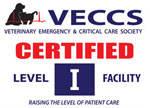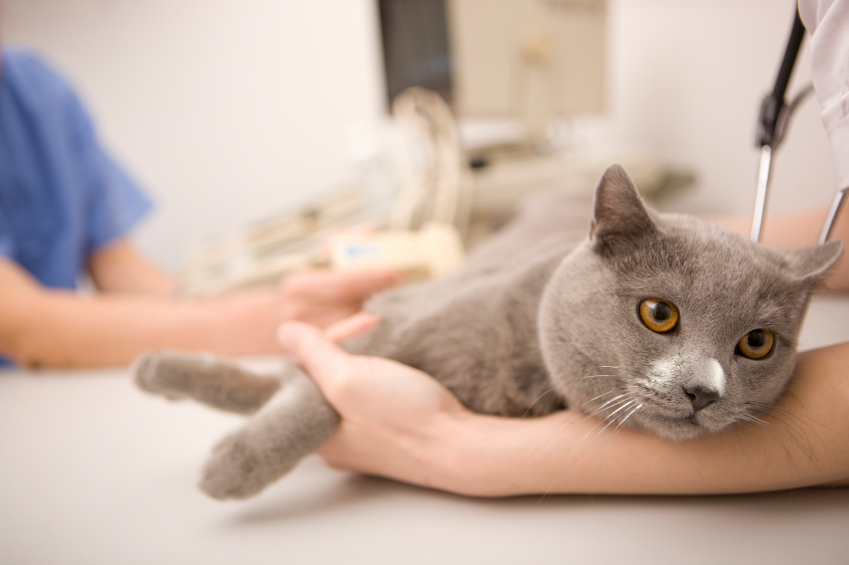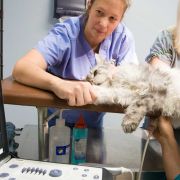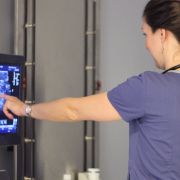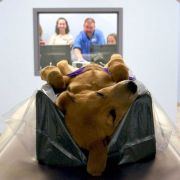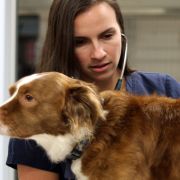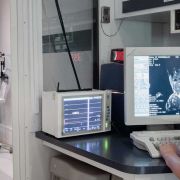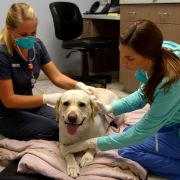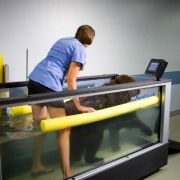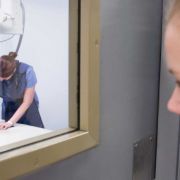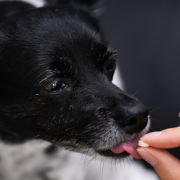Date:
Accidental injuries and unforeseen illnesses affect pets daily, and when your pet’s condition could be serious, only the most advanced, comprehensive veterinary care will do. A pet’s condition can also deteriorate rapidly, and having board-certified veterinary specialists on hand to manage potentially life-threatening complications is invaluable. Charleston Veterinary Referral Center’s emergency and critical care services are available 24 hours per day, 365 days per year, to handle your pet’s most challenging medical conditions. To understand what 24-hour emergency and critical care service, and the expertise of veterinary specialists, means for your pet, follow the stories of three patients who are fortunate their owners chose CVRC.
Jasper’s close call
Jasper is a 2-year-old black Labrador retriever who has endless energy and enthusiasm for life. He has had occasional bouts of gastrointestinal (GI) upset, especially after getting into the trash to find his family’s leftovers. His owners take their four-legged family member’s mischievous personality in stride, but vow each time to better secure the garbage.
One recent morning, Jasper’s owners became concerned when he vomited several times and wasn’t interested in his breakfast. He always devours his meals, whether or not he has a rumbly stomach after dumpster-diving. They were unsure what to do—they knew that some vomiting cases resolve quickly on their own, but others could be cause for serious concern, particularly in a dog with an indiscriminate diet. They decided to be safe rather than sorry, and take him for an exam. Since it was Sunday, and their family veterinarian was closed, Jasper’s owners brought him to CVRC for evaluation.
After a physical exam, bloodwork, and X-rays, our emergency veterinarians pinpointed the problem—Jasper had a piece of a corn cob lodged in his intestines. He was immediately prepped for surgery, and one of our board-certified veterinary surgeons performed an emergency enterotomy and successfully removed the blockage. After surgery, Jasper was transferred to our critical care unit, where our board-certified veterinary criticalists monitored him around the clock while he recovered. Two days later, Jasper was discharged to fully recover in his own home, where the trash can was now secured in a latched cupboard.
Knowing when your pet’s condition is serious can be difficult, but it’s always better to err on the side of caution. Our emergency department can perform the necessary diagnostic tests to decipher minor ailments from life-threatening emergencies, and our board-certified specialists are always available to perform surgery or treat challenging medical conditions, to give your best friend the best chance of recovery. Fortunately, Jasper’s owners did not wait for his condition to escalate before seeking emergency care, since GI foreign bodies can be life-threatening, and a pet’s condition can quickly worsen.
Lucy’s lucky day
Lucy, a fluffy, 4-year-old calico cat, loves to lurk in the shadows and dart toward the open door. Although her family is aware of her stealthy moves, she recently got past her mom, whose arms were full of groceries. She ran outside, and stopped to sniff the air. Then, as her mom came out for her next load, Lucy saw a bird across the street, zeroed in and, totally focused on her target, did not hear the oncoming car, and was struck. The driver stopped, and Lucy’s mom, who saw the entire incident, immediately ran to her, but Lucy jumped up and bolted toward the house, shaking and scared. Her mom was thankful she was alive, and carefully checked her for injuries. She was relieved to find no problems, but wanted an emergency veterinarian to evaluate her cat, in case she had injuries that were not immediately obvious.
On Lucy’s admission to CVRC’s emergency department, she was quiet and calm, but with slightly labored breathing. X-rays revealed several lung contusions (i.e., bruises), which can develop in pets who have been hit by a car, and the emergency veterinarian recommended overnight hospitalization to monitor Lucy for further breathing problems.
Unfortunately, Lucy’s breathing became progressively more labored through the night, and our veterinary criticalist was concerned her injuries were becoming life-threatening. As the only Veterinary Emergency and Critical Care Society (VECCS) Level 1 facility in South Carolina, CVRC is equipped with a ventilator, and our team members are trained to monitor pets with severe respiratory conditions. At 4 a.m., Lucy was sedated and placed on a ventilator in our critical care unit. She was monitored for several days while her lungs healed, until she could breathe comfortably on her own, and then returned home. Her owner was elated, but could not bear to think about the outcome, had she not taken Lucy to a fully equipped emergency hospital, despite seeming OK immediately after the incident.
Any time a pet suffers a traumatic injury, such as being hit by a car, they should be evaluated for evidence of internal injuries. Pets who show no immediate signs of damage are not necessarily out of the woods, since internal injuries can slowly worsen, and become life-threatening. CVRC’s emergency department is always available for your pet’s unexpected injuries and illnesses, and with our resources and special training, we can provide the highest level of emergency and critical patient care.
Lola’s unfortunate misadventure
Lola, a boisterous Weimaraner—as if any Weimaraner is not boisterous—recently went hiking with her owner on a beautiful fall day. Since few other hikers were around, and Lola consistently came when called, she was let off-leash to explore. After an hour of adventure, Lola’s owner leashed her and headed for the car, but paused when he noticed Lola limping. Assuming she had stepped on something, or had hiked too far, he headed straight for CVRC.
When Lola arrived at our emergency department, her owner was surprised that her right front foot had become swollen and sore during the 15-minute ride. After hearing Lola’s injury had developed while hiking, our emergency veterinarian examined her promptly, and found a red, swollen area with two central punctures—tell-tale signs of a snake bite. While Lola was investigating her surroundings, she likely encountered a snake who was not happy to be disturbed.
Since snake bite envenomation can become life-threatening, intensive treatment was initiated on Lola immediately. An intravenous (IV) catheter was placed, fluids and medications were administered to combat shock, and she received pain medications. Lola’s owner had not seen the snake, but her signs were consistent with a rattlesnake bite, so we administered the appropriate antivenin to prevent further progression of symptoms. Lola was admitted to our critical care department for 24-hour care, where our criticalists could monitor her wound and watch for complications, such as bleeding problems, neurologic issues, or an antivenin reaction. Although Lola was in serious condition, and developed muscle tremors overnight, she made a full recovery, and was discharged after 48 hours. Since Lola’s owner brought her to CVRC immediately, tissue necrosis from the snake bite was minimal, and she did not require surgical debridement of her wound, or suffer more significant systemic effects..
Snake bites are common in South Carolina, and can quickly lead to serious, life-threatening complications. Dogs commonly suffer snake bites to the face and front legs, whereas cats are often bitten on the chest; however, if you do not see the snake bite your pet, you may not realize that their sudden lameness or bump is a deadly bite. If you suspect your pet has been bitten by a snake, prompt emergency treatment is critical to minimize tissue damage and prevent a grave outcome. CVRC stocks antivenin that can be administered at a moment’s notice, and our highly trained team is prepared to monitor for and treat severe complications that may develop.
Our emergency department is always ready for your pet’s illnesses and injuries, and our critical care department’s highly trained team can administer sophisticated treatments and monitor the most serious cases. When your pet’s condition may be serious, a 24-hour emergency and critical care hospital, with trained veterinary specialists, offers the best chance of recovery. Contact us if you’re not sure whether your pet’s condition requires emergency care—we can help you decide.



